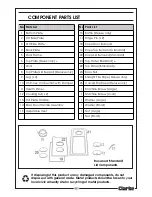
9
THIS STOVE MUST NOT BE INSTALLED INTO A CHIMNEY THAT SERVES ANY
OTHER HEATING APPLIANCE. THERE MUST NOT BE AN EXTRACTOR FAN
FITTED IN THE SAME ROOM AS THE STOVE, AS THIS CAN CAUSE THE
STOVE TO EMIT FUMES INTO THE ROOM.
FLUE HEIGHT
The chimney height and the position of the chimney should conform to the
Building Regulations document “J”. Flues should be high enough to clear the
products of combustion. The height necessary for this will depend on the type
of the appliance, the height of the building, the type of flue and the number
of bends in it, and an assessment of local wind patterns. However, a minimum
flue height of 4.5m could be satisfactory if the guidance in paragraphs 2.10
to 2.12 of the Approved Document “J” is adopted.
External flue pipes should be Twin Wall. These retain the heat, enabling it to
rise and disperse from the chimney.
Fig 5
As an alternative approach, the calculation procedure within BS EN 13384-
1:2005 can be used as the basis for deciding whether a chimney design will
provide sufficient draught. If in doubt, consult the Building Regulations.
The outlet from a flue should be above the roof of the building in a position
where the products of combustion can discharge freely and will not present
a fire hazard, whatever the wind conditions.










































